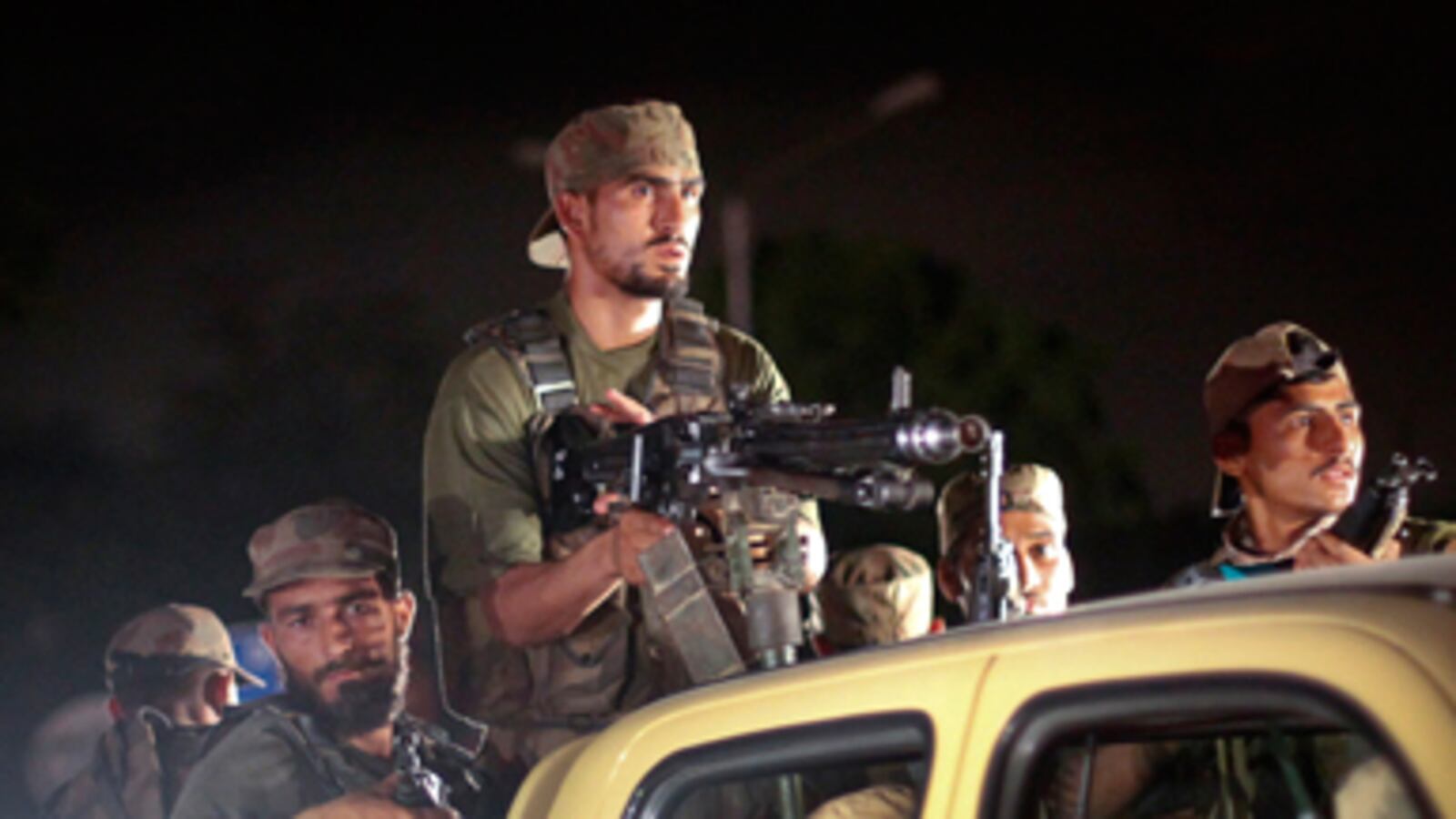Last night, a well-briefed and coordinated team of about a dozen Pakistani Taliban gunmen fought their way deeply inside the heavily guarded Mehran Naval Air Station in the southern port city of Karachi. Armed with AK-47s, RPGs, hand-grenades, and prepared for a long standoff with food and water, the attackers destroyed at least two U.S.-made P-3C Orion maritime surveillance planes. Unleashing RPG fire, they damaged several other aircraft, igniting blazes and setting off billowing columns of smoke. The jihadists held off Pakistani naval and army commandos for some 16 hours before finally being overwhelmed. At least 10 Pakistani soldiers were killed.

The raid, coming just weeks after U.S. Navy SEALS swept into Abbottabad and killed Osama bin Laden, marked the second time in a month that the Pakistani military—without question the country’s most powerful institution—was caught noticeably off guard.
A spokesman for the Pakistani Taliban, who are largely based in the Waziristan tribal area, claimed the operation was launched to avenge the “martyrdom” of Osama bin Laden. That makes it the third such revenge attack claimed by Pakistani militants since bin Laden’s death. A double suicide bombing earlier this month killed some 90 paramilitary recruits in northwest Pakistan as they were about to set off on leave, and last week a roadside bomb injured at least two Americans who were riding in an armored vehicle near the U.S. Consulate in Peshawar.
The Mehran raid, however, is more psychologically significant. It marks the militants’ most audacious assault on the Pakistani military since October 2009 when about a dozen gunmen attacked and seized parts of the Pakistani army’s headquarters near Islamabad for 22 hours. “It was no doubt a major security lapse on the part of the military,” says retired Pakistani army Lt. Gen. Talat Masood. “It also shows the initiative seems to be in the hands of these jihadi elements who are taking advantage of the old system of security that we have.”
Despite the militants’ claims that this was a revenge attack, military analysts, Pakistani intelligence officers, and even the Afghan Taliban doubt that the militants planned and executed this relatively sophisticated operation in three short weeks. Rather they said an operation of this kind, which bore all the hallmarks of the late 2008 Pakistani militant attack on the Indian financial capital of Mumbai, took most likely far longer to prepare.
As in the Mumbai operation, which was carried out by organizers and gunmen who may have had past links to the Pakistani military, the attackers had a detailed knowledge of the target, were well-trained and rehearsed, had good radio communications, and had enough firepower and even food and water to prepare for a long siege. “They had a very well thought out and detailed plan,” says Masood. “It was not something that just happened ad hoc. [The militants] may say it was in retaliation for bin Laden’s death, but in fact the plan for this attack seems to have been made much before that.”
The attack was certainly not carried out by militants from the tribal area who are largely suicide bombers, but by veteran jihadis who are seasoned in commando-style operations. “This attack had detailed planning and intelligence behind it,” says a Pakistani intelligence officer who is not authorized to speak to the press. “The attackers came from a more sophisticated organization.”
“This operation is most likely the product of a nexus of fairly sophisticated groups like those who have fought in Kashmir and Afghanistan, the kind of people who were involved in the Mumbai incident,” adds Masood.
An Afghan Taliban intelligence officer, who frequently visits Pakistan’s tribal zone and knows the tribal militants there, agrees. “These attacks demand a higher level of capacity than tribal militants possess, and require weeks and if not months of homework and planning before you go ahead,” he says. Indeed the level of sophistication of the attack prompts some analysts to believe that the most-wanted, al Qaeda-linked militant leader Ilyas Kashmiri may have had a hand in planning the attack. Kashmiri once served in the Pakistani army and was trained by the army and its intelligence agency for anti-Indian operations in disputed Kashmir before he went rogue. “Kashmiri knows the mentality and habits of Pak military and installations more than anyone else,” says the Taliban intelligence officer.
“[The attack] shows the initiative seems to be in the hands of these jihadi elements who are taking advantage of the old system of security that we have.”
Rehman Malik, Pakistan’s interior minister, says the attackers, who were all killed, were dressed in dark trousers and shirts, not in military uniforms as had been reported, and resembled “Star Wars” characters. He didn’t explain that reference. The gunmen also possessed an intimate knowledge of the base and were able to quickly advance toward the hangars, workshops, and buildings located along the flight-line. Their rapid penetration through the base raises the specter of some inside cooperation from militarymen sympathetic to the Taliban’s cause.
Just as important, the attack once again calls into question the military’s ability to protect its most important assets, such as expensive aircraft, and perhaps even the country’s some 100 nuclear weapons. Chillingly Masroor Air Force Base, the country’s largest and a reported depot for some of the country’s air-launched nuclear weapons, is located only 15 miles from Mehran. “It’s a huge setback for the military,” says Masood. “They can’t take it lightly anymore and have to beef up security tenfold.”
The Mehran attack could be the harbinger of similar militant operations to come. “The situation will only get worse for Pakistan after Osama bin Laden’s death,” predicts the Taliban intelligence officer. “Everyone (among the militants) is angry. They want to put pressure on all the frontlines.”
Ron Moreau is Newsweek’s Afghanistan and Pakistan correspondent and has been covering the region for the magazine the past 10 years. Since he first joined Newsweek during the Vietnam War, he has reported extensively from Asia, the Middle East and Latin America.
Sami Yousafzai is Newsweek's correspondent in Pakistan and Afghanistan, where he has covered militancy, Al Qaeda and the Taliban for the magazine since 9/11. He was born in Afghanistan but moved to Pakistan with his family after the Russian invasion in 1979. He began his career as a sports journalist but switched to war reporting in 1997.






